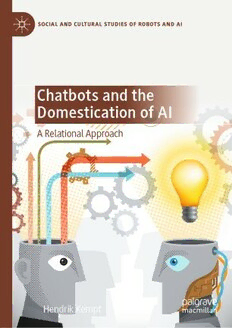Table Of ContentSOCIAL AND CULTURAL STUDIES OF ROBOTS AND AI
Chatbots and the
Domestication of AI
A Relational Approach
Hendrik Kempt
Social and Cultural Studies of Robots and AI
Series Editors
Kathleen Richardson
Faculty of Computing, Engineering, and Media
De Montfort University
Leicester, UK
Cathrine Hasse
Danish School of Education
Aarhus University
Copenhagen, Denmark
Teresa Heffernan
Department of English
St. Mary’s University
Halifax, NS, Canada
This is a groundbreaking series that investigates the ways in which the
“robot revolution” is shifting our understanding of what it means to be
human. With robots filling a variety of roles in society—from soldiers
to loving companions—we can see that the second machine age is
already here. This raises questions about the future of labor, war, our
environment, and even human-to-human relationships.
More information about this series at
http://www.palgrave.com/gp/series/15887
Hendrik Kempt
Chatbots
and the Domestication
of AI
A Relational Approach
Hendrik Kempt
Institute of Applied Ethics
RWTH Aachen
Aachen, Germany
ISSN 2523-8523 ISSN 2523-8531 (electronic)
Social and Cultural Studies of Robots and AI
ISBN 978-3-030-56289-2 ISBN 978-3-030-56290-8 (eBook)
https://doi.org/10.1007/978-3-030-56290-8
© The Editor(s) (if applicable) and The Author(s), under exclusive license to Springer
Nature Switzerland AG 2020
This work is subject to copyright. All rights are solely and exclusively licensed by the
Publisher, whether the whole or part of the material is concerned, specifically the rights
of translation, reprinting, reuse of illustrations, recitation, broadcasting, reproduction on
microfilms or in any other physical way, and transmission or information storage and
retrieval,electronicadaptation,computersoftware,orbysimilarordissimilarmethodology
now known or hereafter developed.
The use of general descriptive names, registered names, trademarks, service marks, etc.
in this publication does not imply, even in the absence of a specific statement, that such
namesareexemptfromtherelevantprotectivelawsandregulationsandthereforefreefor
general use.
Thepublisher,theauthorsandtheeditorsaresafetoassumethattheadviceandinforma-
tion in this book are believed to be true and accurate at the date of publication. Neither
the publisher nor the authors or the editors give a warranty, expressed or implied, with
respecttothematerialcontainedhereinorforanyerrorsoromissionsthatmayhavebeen
made.Thepublisherremainsneutralwithregardtojurisdictionalclaimsinpublishedmaps
and institutional affiliations.
Cover credit: exdez/DigitalVision Vectors/Getty Images
This Palgrave Macmillan imprint is published by the registered company Springer Nature
Switzerland AG
The registered company address is: Gewerbestrasse 11, 6330 Cham, Switzerland
“πα´ντων χρημα´των μšτρoν’ ¥νθρωπoν ε(cid:2)ναι,
‘τîν μ(cid:3)ν Ôντων æς (cid:4)στι, τîν δ(cid:3) μη` Ôντων æς oÙκ (cid:4)στιν”—Protagoras.
“The human is the ultimate measure of all things, of the existence of things
that exist, as well as the non-existence of things that do not
exist.”—Protagoras
Acknowledgments
Nobody writes a book without accruing considerable social debt with
others. To repay this debt, I want to extend my sincere thanks to some
people who helped me realize this project from its inception to its
completion.
Ipresentedsomeofmyearlyargumentsatthebiannualjointsessionof
theNCPSandSPSCinRockHill,SouthCarolina,andatthemeetingof
the Society for Philosophy of Technology in College Station, Texas. I am
gratefulfortheopportunitytohavedonesoandforthevaluablefeedback
that shaped my arguments.
I want to thank my supervisor, Prof. Carl Friedrich Gethmann, for
providing the space and intellectual freedom to work on this project, and
my colleagues in Siegen, Dr. Bruno Gransche, Sebastian Nähr-Wagener,
Jacqueline Bellon, and Dr. Michael Nerurkar for discussing my ideas
on multiple occasions. I am especially indebted to Prof. Alon Lavie
for providing me feedback on parts of my draft, advice on the current
developments in natural language processing, and encouragement on a
personal level.
Further, I profited greatly from witnessing many debates of philoso-
phersoftechnologyonTwitter.Thisnew,highlyaccessible,andfast-paced
space for public debate had a substantial influence on my understanding
of current issues, and it might be surprising for someone to address this
source of inspiration. But without philosophers on Twitter exchanging
arguments, announcing projects and publications, and sharing articles
vii
viii ACKNOWLEDGMENTS
and news, I would have missed out on many philosophically relevant
information.
Ialsowanttothankthisseries’editorProf.KathleenRichardson,who
saw the relevance of my idea and encouraged me to pursue it further, as
well as Rachel Daniel and Madison Allums from Palgrave Macmillan for
their assistance in making this project as a success.
Lastly, I want to thank my husband John, my family, and my friends,
who all remained supportive even when I had nothing else to talk about
but chatbots.
Praise for Chatbotsandthe
DomesticationofAI
“A significant contribution to thinking about human-machine relation-
ships. Instead of seeing chatbots as decontextualized things, Kempt
explores how chatbots intervene in human social discourse and its
epistemology, and contributes to the further development of a rela-
tional approach in contemporary debates about the moral standing of
machines.”
—Mark Coeckelbergh, Professor of Media and Technology, University of
Vienna, Austria, and author of Introduction to Philosophy of
Technology (2019) and AI Ethics (2019)
“Anthropomorphism has been something of a ‘dirty word’ in the fields
of AI and robotics. In this book, Hendrik Kempt critically reactualizes
the concept, demonstrating how these anthropomorphic tendencies—
tendencies that are seemingly irrepressible in the face of chatbots, digital
assistants, and other things that talk—are not a bug to be eliminated
but a social feature to be carefully cultivated and managed. Thinking
beyondessentialistexplanationsandtheories,Kemptdevelopsarelational
approachtothesocialthatisresponsivetoandcanberesponsibleforthe
opportunities and challenges of the 21st century.”
—David Gunkel, Professor of Media Studies, Northern Illinois University,
USA, and author of The Machine Question: Critical Perspectives on AI,
Robots and Ethics (2012)
ix
x PRAISE FOR CHATBOTS AND THE DOMESTICATION OF AI
“Hendrik Kempt’s thought-provoking book is an impressive rational
examination of the place and social role that modern human society
is creating and establishing for artificial conversational agents, and how
our social relationships with such agents could potentially evolve in the
future.AsascientistwhohasspenthiscareerdevelopingAI-basedhuman
languagetechnology,Iwasfascinatedbythisguidedphilosophicaltourof
thepotentialsociologicalconsequencesofourscientificbodyofwork.It’s
a highly recommended and intellectually satisfying read.”
—Alon Lavie, Research Professor, Language Technologies Institute,
Carnegie Mellon University, USA, and former President of the
International Association for Machine Translation (2013–2015)

